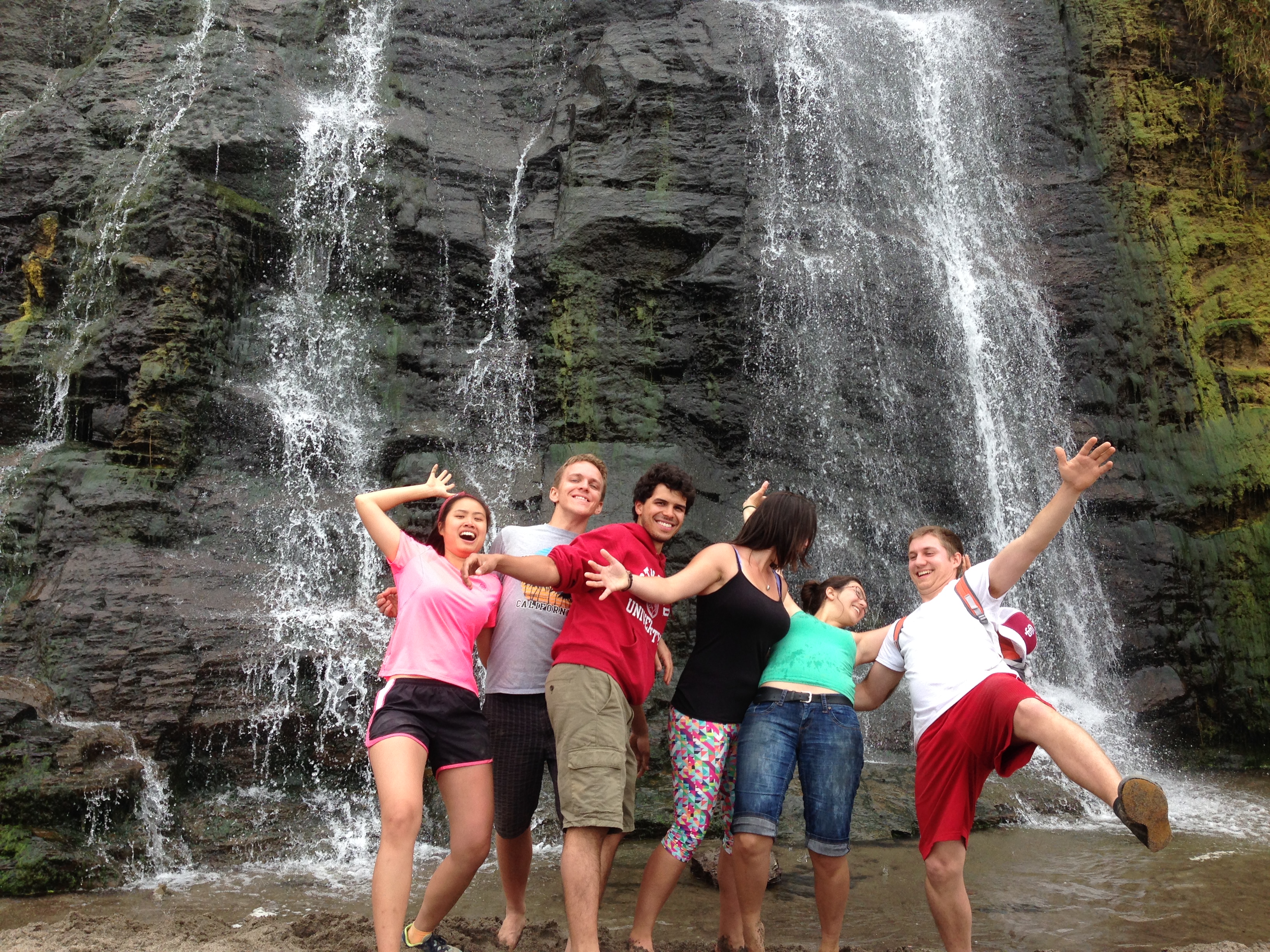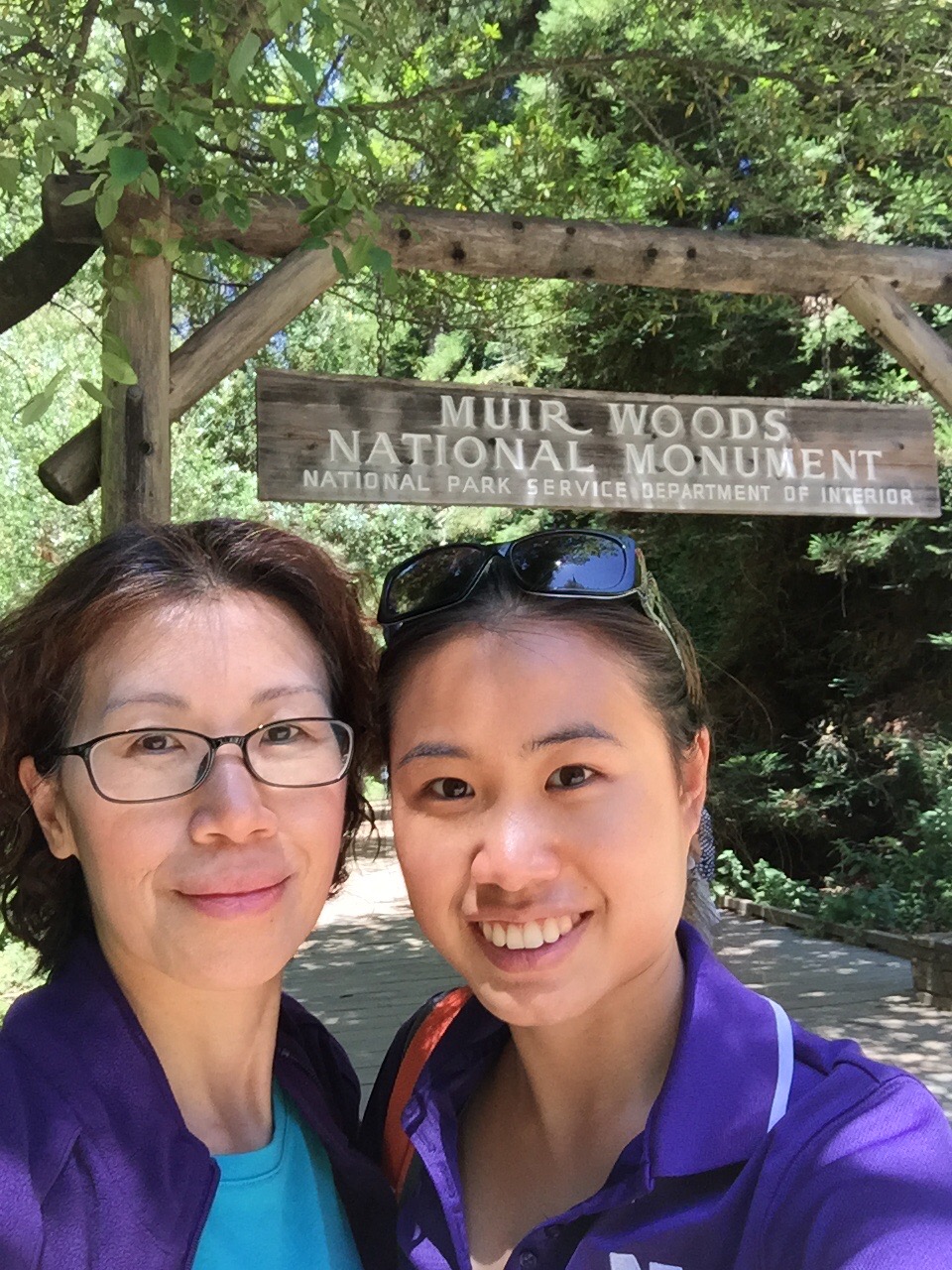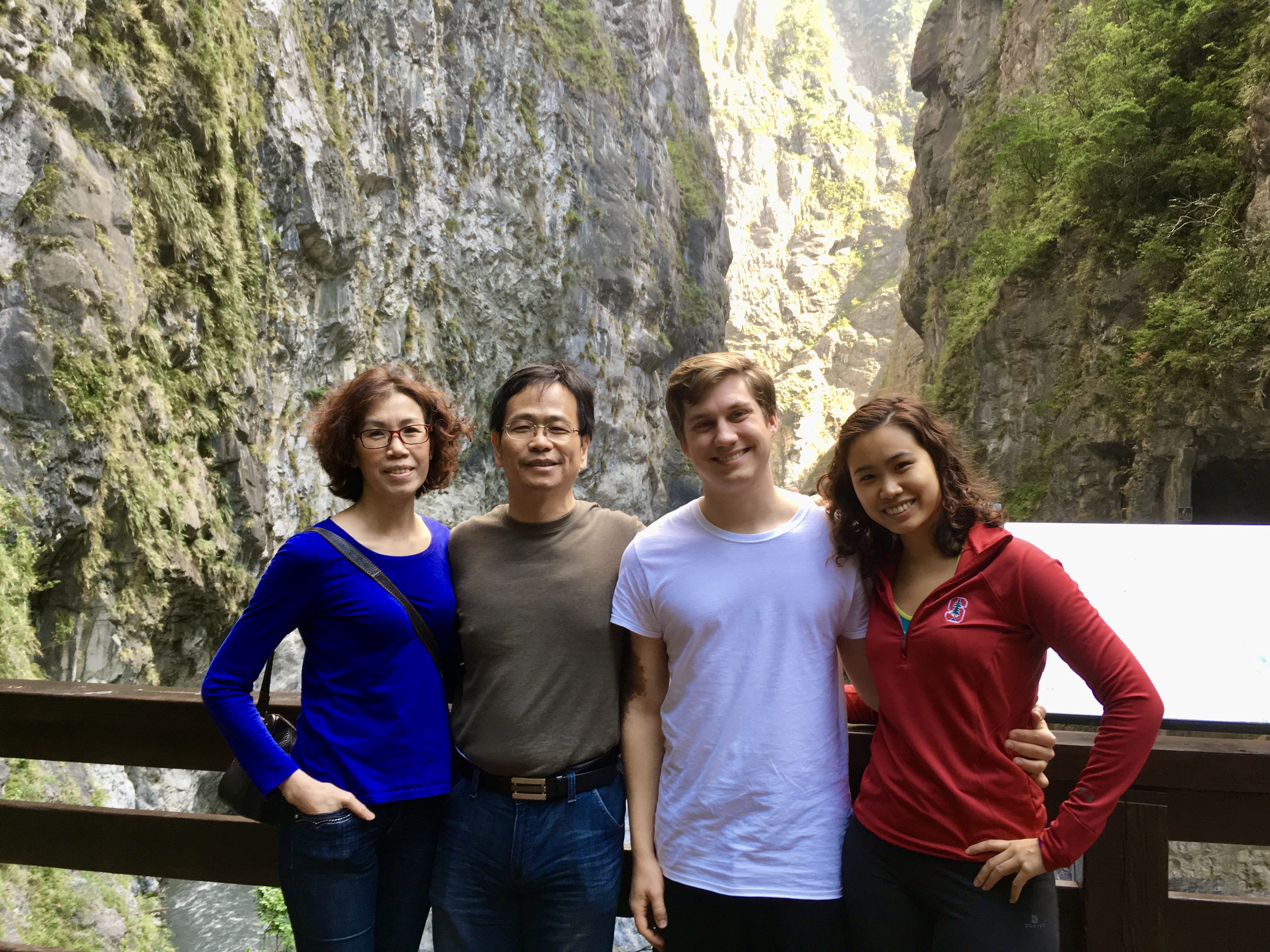這篇文章是為了回答華玉的問題寫的。適逢我從史丹佛畢業三年,趁著這個機會,回顧我這一生中重大的轉折點,思考我曾經做過的抉擇,並且展望自己期許的未來。(一開始只想挑兩三個重點,寫篇簡單的散文,沒想到越梳理越多,趁著現在還有點時間好好思考紀錄,寫成了這篇大概是我部落格裡最長的文章之一。以後應該會越來越忙,不知道下次有時間這樣仔細地反思、紀錄是什麼時候了。)
台灣(-2009)
猶記小時候讀偉人傳記,最常看到的情節就是某某某從小立志,然後努力不懈地朝著自己的目標邁進,終於成就了他千古流芳的事蹟。比方說,書聖王羲之從小勤練書法,洗毛筆、硯台洗到把門口的池子洗成了「墨池」,最後成了中國史上最著名的書法家;美國的發明大王愛迪生,雖然小時候跟學校教育格格不入,但是他從少年時期就愛嘗試做各種實驗,後來留下了許多對世界影響極大的發明;南非的反種族隔離鬥士曼德拉,學生時期就投身於抗議各種不公的白人法規,後來還遭監禁數十年,最後成功地終結了南非的種族隔離政策,也成為了歷史上人權和民族和解的象徵。但是我從來不是那種自小立下志向便義無反顧地向前的人(所以我大概沒有成為偉人的體質);相反地,我的目標和夢想時常改變,並且似乎容易受到我的導師們(不只是我的父母和學校老師,也包括了一些我打從心底尊敬、視為榜樣的人)的影響。
國二以前,我一直認為我以後會唸文組。我從小熱愛文史,段考前老師讓我們用來複習的時間都被我偷偷挪用來讀歷史小說或是世界名著。在那個考試前不愛唸書的年紀,國文、史地、英文,甚至一些相關的競賽,對我來說都是舉重若輕,而我當年最引以為傲的才華就是我的生花妙筆和我的口若懸河。相反地,我的數理總是在及格邊緣,但是我並不怎麼在乎。如果當年我有任何比較貼近現實的「志向」,大概就是長大以後成為一問意氣風發的律師,把我所有的對手都辯得啞口無言。
從文組到理組的轉折大約發生在國二。當年我的班導是位數學老師,不但數學教得好,也賞識我、願意栽培我,所以我下定決心至少要把數學學好。沒想到數學學好之後,理化也跟著大幅進步,老師對我有越來越殷切的期許,所以我國三時決定一定要努力成為全校第一個考上中女數資的學生,以報答老師的知遇之恩。(我還記得當年放榜時,上英文課上到一半,老師突然從教室窗戶邊冒出來,在窗外激動地用口型告訴我我考上時的驚喜。)因為台灣教育系統的緣故,這個轉折提早註定了我日後踏上理科的不歸路。
在中女十八班的三年,我過得非常充實精彩。我有最優秀的同學、最豐富的教育資源,書也唸的不錯,但我對未來卻一度非常迷茫。當時班上的巾幗英雄們大部分朝著醫科的方向努力,我們的課綱大致上也是為考上醫科設計的,但是我總是一見到血就會手軟,蛙剖課上到一半都能抱著肚子跑出去吐,所以我很早就知道我不是唸醫科的料(爸爸媽媽也從未積極鼓勵我學醫)。而且當年我和班導相處得不是很融洽,我物理學得一塌糊塗,他也總是暗示我誤入歧途。有一段時間我很認真地考慮轉文組,後來在媽媽不斷強調基礎科學訓練的重要性之後才作罷。但是我從此在心中就憋著一口氣,要向不看好我的班導證明,我能把他所謂的「歧途」走得光芒萬丈。
後來我想起了小時候出國留學的夢想:我希望能開拓自己的視野、提升自己的境界、體驗不一樣的生活,而且美國的學制讓我可以等到大二再選主修,讓我有更多的時間思考自己的方向。於是我義無反顧地開始朝著這個方向衝刺,高二上學期之後,我放棄了除了科展之外的所有理科競賽(因為科展不是我一個人的事,我不能拖累我的組員),在學校課業、準備出國、儀隊表演和少數幾項課外活動間掙扎求生。雖然十分辛苦,但是我頑強地告訴自己只許成功不許失敗,因為在我心高氣傲的少女時代,是絕對不允許班導暗示的「誤入歧途」一語成讖的。在考試和寫申請書時,我最大限度地利用了扎實的數理訓練帶給我的優勢,但我對物理的厭惡讓我十分篤定以後絕對不會念理科,後來在台灣唯一申請的學校是台大財金,算是平衡了我回歸文組的渴望,也不白白浪費了這麼多年的數學基礎(雖然我不想承認,因為現在想想有點幼稚,但當年的確也有一些和班導賭氣的成份在。)



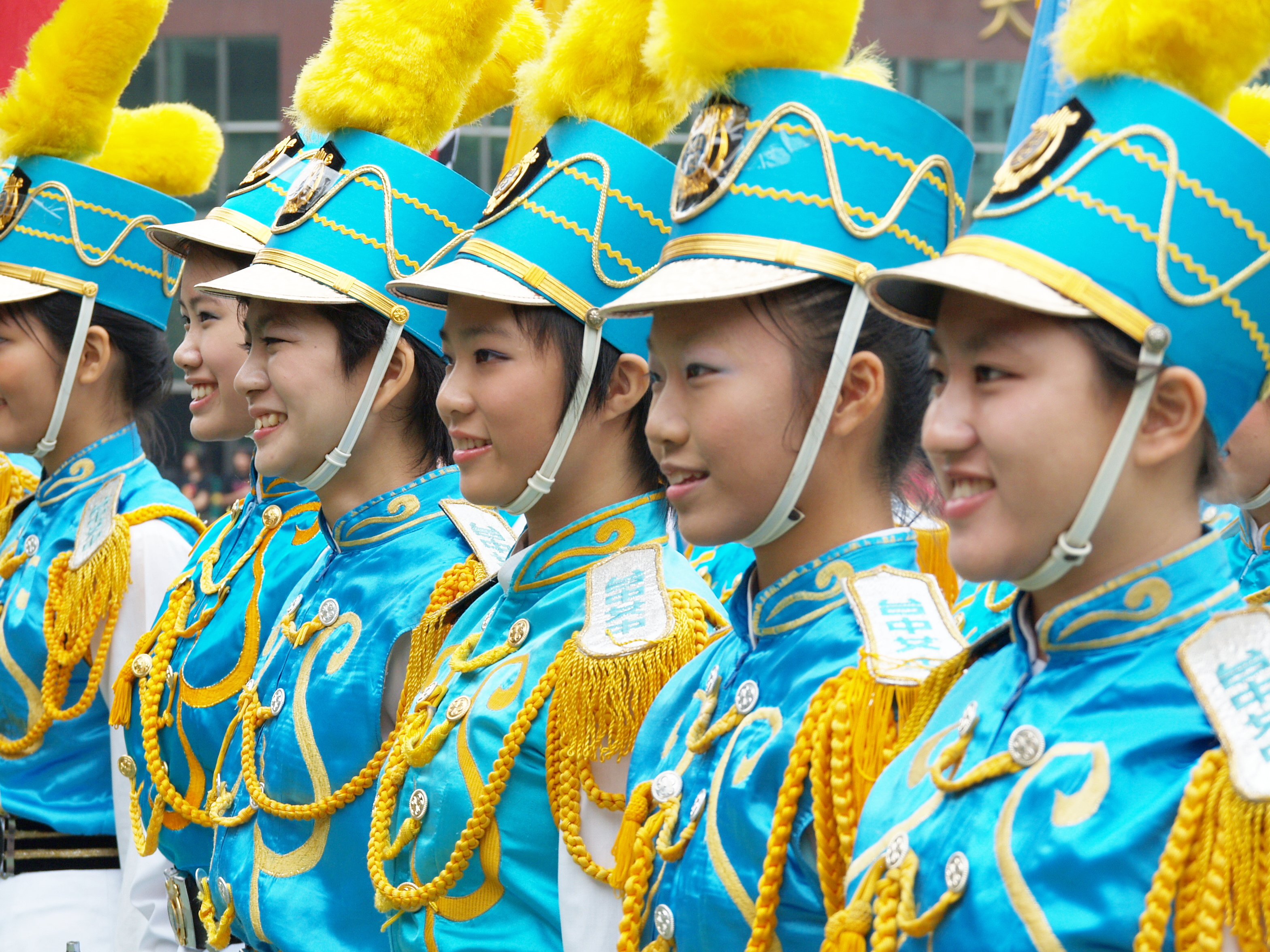



美國:求學(2009-2018)
出國是我人生的另一大轉折。我在西北大學大二時,跌破眾人眼鏡地選擇了雙主修化學和語言學——這是我在台灣絕對不可能會選擇的科系。會選擇化學是因為大一時上了幾堂有機化學,激活了我的思路,西北大學的化學系也是全球頂尖。而且我大一結束時,初試啼聲地找研究專案時,非常幸運地碰到一位賞識我、願意給我這個大一菜鳥機會的指導教授。實驗室裡的大哥哥大姐姐們也都非常照顧我,我從他們身上學習很多,潛意識裡便希望成為像他們一樣的人。選語言學則是完全遵從了自己的心——我知道我骨子裡對文史還是充滿熱情,但是在一個不說自己母語的國家裡,我唸文組沒有任何優勢。而且高中唸了三年理組,有些理科生的思考模式在我腦海中已經定型了。語言學不是文學,而是一門社會科學——用科學的方法研究我們習以為常的語言——這對我來說,就是運用我熟悉的思路和工具來研究一個我喜歡的項目。大四時修的計算語言學,更是陰錯陽差地讓我開始接觸程式編碼,對我在史丹佛後期的研究和第一份工作比任何化學課的影響都大。
現在想想,我選系時顯得有些隨心所欲,實用性的考量有一些,但是更多取決於當下我碰到哪些人、想學習什麼。這並不表示我做了不負責任的選擇:我在這兩門主修的表現都很好,而且有了爸爸媽媽的榜樣,我一直堅信長遠來說,我學習的「能力」會比我學習的「項目」重要。當然,擁有扎實的知識基礎是最基本的要求,但我應該利用這些具有挑戰性的項目來鍛鍊我的學習能力,而不是受到項目的限制。這樣的想法有些浪漫和理想主義的成份,因為這並不能回答我大學畢業後應該何去何從。後來選擇繼續攻讀博士,跟我當初考中女數資的動機如出一轍,為了報答我的指導教授、我的研究生導師還有我整個實驗室的知遇之恩——為了他們,我要唸全世界最好的化學所。


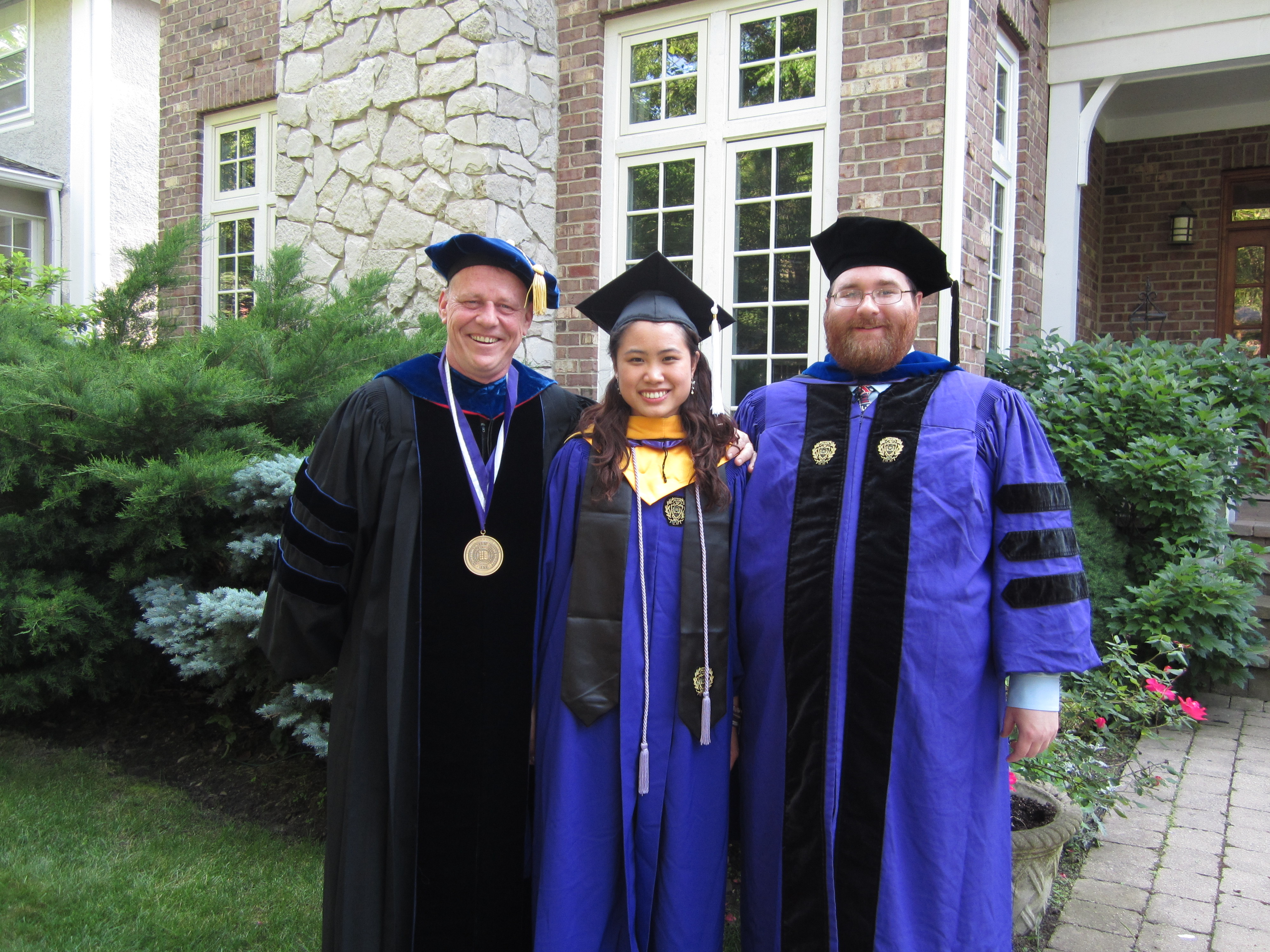
剛到史丹佛時,意氣風發之餘,我也隱隱有一絲走進死胡同的擔憂,因為我知道我大概不是做科研的料,但是我也知道史丹佛是一所資源極為豐富的綜合型大學,博士已是最終學位,我必須利用這段相對彈性的時間,善用學校所有的資源為自己日後的職涯找到方向,打下基礎。從踏進研究所的第一天,我就不斷提醒自己,不要落入博士班把自己的路越走越窄的陷阱,一定要好好把握時間、利用身邊所有的資源,把自己的路越走越寬。將近五年下來,我覺得我確實做到了這一點,只是過程並不如我想像的順利。
一開始我對醫藥和生化方面的研究還是充滿熱情的。我加入了一個頗負盛名的有機化學實驗室,期待能和我無機化學與電化學的背景擦出不一樣的火花。但是我第一年在實驗室的慘痛經驗當頭澆了我一大盆冷水,我迎來了我在研究所的第一個轉折——在看了幾次心理醫師之後,我知道我必須全力掙脫這個令我窒息的鯊魚缸,即使代價有可能是拿不到學位,否則後果不堪設想。於是我開始了萬里長征般的轉組過程(我父母和一些比較相熟的朋友都知道這段不堪回首的往事,我就不在此多加贅述了),好在最後我在地球科學院找到了一位願意收留我的年輕教授,她的實驗室風氣非常健康正向,也很支持我自由發揮,讓我在轉組之後還是在五年內平平安安拿到了博士學位。
我從這個轉折中學到三件事:第一,我對名牌的迷思退散了不少。在這之前的十年,我在每一個求學階段都非常執著於所謂的「名校光環」——國中時努力考上明星高中、高中時努力申請美國菁英大學、大學時努力申請世界頂尖的研究所。「名校」對我來說代表豐富的學習資源、優秀的老師和同學、精彩的校園生活、 提升自己的契機、畢業後無窮的機會(當然還有對自己實力的肯定和滿足我小小的虛榮心)。在上研究所以前,這層關聯基本上是正確的,所以在選研究室時,我就參照了以往的成功經驗,爭取加入了一個名牌實驗室,但是天真的我當時卻不知道在學術界鬆散的結構、終身聘的制度和各種政治角力之下,盛名的光環下常有我不願涉足的陰影:慘酷的競爭、惡意的人身攻擊、無情的利用、對學術道德的踐踏。所以我在尋找下一個實驗室時,我不斷提醒自己不要被實驗室外在的光環眩花了雙眼,而是必須深入了解指導教授是位怎樣的領袖、實驗室的同仁平常如何相處、我加入了這個實驗室的日常生活會是什麼樣子。換句話說,我了解到名牌不等於未來發展的保證,所以我必須用更多方法搜集更多的資訊為自己做出最好的決定,也必須放下我的虛榮心,不再迷信名牌。很幸運地,我第二個指導教授是我碰過最好的科學家之一,我在她的實驗室裡如魚得水,做研究的效率大幅提升、學習了大量的新知,也結交了許多好朋友。許多人聽到我轉到知名度比較低的地球科學院實驗室後,常常會露出禮貌而困惑的表情,但是我發現我已經不那麼在意其他人的眼光了。後來我在找工作時,雖然申請的大多也是大公司,但是錄取後也花了不少時間深入研究比較,而不是自動選擇最大牌的公司。我不敢說我做的每一個決定都正確,但是至少我在選擇之後對我的未來會有比較務實的期許,也盡量避免落入像我第一個實驗室的困境。
第二,我開始慢慢覺得「科學家」對我來說是一種生活態度,而不是一種職業或身份。從有機和生化到地質化學的轉折是非常生硬的,但是我爬了幾個月的學習曲線之後,做研究的速度不減反升。很大一部分的原因是因為研究環境大幅改善,提升了我的效率,但我也開始體悟到我在研究所學習的不是如何成為「有機化學家」、「無機化學家」或是「地質化學家」;我學的是科學的思考方式:我要解決的是什麼樣的問題?我有什麼假說可以解決這個問題?我要設計什麼樣的實驗才能證明我的假說?我該如何執行我的實驗?我要如何分析、理解我的實驗數據來解決我一開始要解決的問題?如果結果不如預期,我開如何修正?其實這套方法放諸四海皆準,無論是有機化學、地質化學、化學以外的學科,甚至商業的問題,都可以套用這種思考模式,所以我不再執著於我究竟是什麼「家」,而是專注於靈活地運用這種方法解決各式各樣的問題。我寫博士論文時,前半段是我在第一個研究室做的催化劑和生物發光研究,後半段是土壤有機碳的分析和模型,乍看之下八竿子打不著,但分析化學和背後這套科學思考的方法能把他們串連起來(所以後來為了方便,我就開始自稱分析化學家了)。當我把科學當成一種指引我的綱領和思考方式而不是一個有疆界的領域時,我日後的職涯選擇也不僅限於科研了,因為我相信我扎實的基礎科學訓練讓我具備了解決不同領域問題的能力。(所以即使我現在的工作和我的博士論文沒有直接的關聯,我也從來不覺得我在史丹佛的五年是在浪費時間。)
第三,比起我的工作內容本身,我發現我身邊的人對我的效率和創造力的影響大得多。我曾經隱約意識到這一點,因為在這之前的十年,我最亮眼的表現背後的動力不是要報答知遇之恩(考上中女數資和申請上史丹佛),就是要向不看好我的人證明他們看走眼了(申請上台大財金和西北大學、大學畢業時包攬系上各大獎項,到後來研究所準時畢業,也有一些和第一位指導教授較勁的意味)。我很幸運,前半生的學習環境都不錯,一路上碰到了許多支持我的人,所以一直發展得頗為順利,雖然有經歷過壓力極大或是完全陌生的環境,但是卻幾乎不曾面對赤裸裸的惡意。當我第一次深陷一個淬了毒的環境,我才發現我的學習能力、創造力、辦事效率、讓我保持陽光積極的正能量,還有帶給我身邊的人溫暖和快樂的渲染力都遭到了巨大的打擊。我花了九牛二虎之力掙脫了這個環境之後,就發誓絕對不會再讓自己陷入同樣的泥淖。進入一個新環境之前,我必須先小心觀察、搜集資訊,確保我進入的是一個能讓我蓬勃發展的地方,如果不幸地又陷入一個有毒的環境,一定要想辦法在事態惡化前及早脫身。人生苦短,我一定要讓自己周圍充滿積極正面、能讓我向上提升的人。
換了實驗室之後,我過了將近三年充實又快樂的時光。做研究之餘,我也好好利用了史丹佛這座寶庫,盡情探索不同的領域。研三開始,我每個學季都要求自己修一門科學以外的課,從談判學、會計學到專利法。我也持續參加大量的課外活動,從新創公司、醫療管理諮詢、政策制定到學生事務。(神奇的是,這些大量的「外務」並沒有耽誤我的研究。相反地,我常常會有意想不到的創意,也越來越能將科學與實驗室以外的世界融會貫通,或許良好的環境對我的能力有正向加成的效果吧!)我培養了許多不同的技能,也更深入的認識了自己——我發現自己雖然很喜歡也很珍惜我的基礎科學訓練,但是我真的不適合一輩子泡在實驗室,因為我渴望和更多不同的人合作、為這個世界帶來更直接更廣泛的正向影響,而畢業後的第一份工作,是轉換跑道的良機。





美國:職場(2018 -)
從化學博士到萬事達卡的商業顧問大概是我目前最硬的轉折了。(想當年我大學申請台大財金,似乎彎彎繞繞地又走回同一個方向,但是中間的過程卻讓相同的方向帶上了不一樣的五彩繽紛。)許多人常常好奇地問我為什麼,但是其實從博士班轉到管理顧問並沒有想像中的罕見,跟我同屆畢業的就有好幾個。除了面試時那些我侃侃而談的理由之外,還有一些比較個人的因素。就像我在《夢想》一文中提到的,我長大了,但是夢想卻為了屈就現實而變得越來越小,因為我多了不少現實的考量,包括不同產業的招聘時程、工作簽證、薪資福利等等。管理顧問滿足了我幾乎全部的現實考量、讓我有機會運用的我的科學訓練解決不同的問題,也為我未來進入其他的領域提供可能的跳板。更重要的是,在我媽媽被診斷出癌症轉移後,我看待工作和生活的態度改變了。2016年以前,我某種程度上應該可以算個工作狂:我非常認真地工作、工作是我生活的最大重心、我用工作上的成敗來衡量自己的價值、我不在研究室的時間都被課外活動塞得滿滿的。雖然我每年回家都會花很多時間陪家人,平時也會確保自己撥出一定的時間和朋友相處,但直到2016年一月我從醫院直接去機場,我才真正意識到我愛的人們對我來說有多麽重要。
於是我經歷了另一個轉折,重新思考了我的生活和目標。以前我總認為所謂「工作和生活的平衡」就代表工作和生活要各佔多少百分比,而身為工作狂,工作占的百分比當然比生活高很多。但是我慢慢開始認為我的生命是一個整體,我不應該只是獨斷地將它切割成兩部分並分配百分比。相反地,我對我的生命有追求、有目標,我的工作、生活,和其他許多生命的面相(健康、興趣、家庭,自我實現……等等)都是達成我的目標的途徑,它們應該要相輔相成,而不是互相排斥。而我的目標究竟是什麼呢?我希望能不斷地學習新知,並靈活地將知識運用在不同的領域,因為在這個快速變遷的世界裡,唯有不斷地學習適應才能保持競爭力、不被時代淘汰;我希望能為這個世界帶來正向的影響,不論是透過有影響力的工作、平時和家人朋友的相處,還是其他管道;我希望和我愛的人們保持緊密的連結,共同創造有意義的回憶,如此一來如果有有一天我們其中任何一個人離開了,留下的會是美好而不是遺憾。俗話說:「人生如棋」——在我的棋局裡,我就要落子無悔。
以前我的目標常常改變:要念文組還是理組、要主修什麼學科、要做什麼領域的研究……等等,但是自從2016年我認清了我心底深處對自己生命的追求後,即使我表面上的道路改變了,我最根本的目標卻始終如一,我做的所有選擇(包括我選的工作)都是為了要達成這些最根本的目標。我在研究所不斷學習科學和科學以外的知識,就是為了培養自己的學習能力;轉戰商業管理以後,我也不斷嘗試各種不同的專案,利用我的學習能力累積不同方面的經驗,為自己的未來創造更多可能的機會。我在研究所後三年的所有課外活動,幾乎都是為了服務學生和幫助改善學校的營運,達成我心目中「正向的影響」;開始工作以後,我努力成為同事心目中認真優秀的好隊友,我將公司給我的福利、彈性和經濟條件投注於一些我關心的議題,而我無論參與什麼活動或團體,都盡力讓自己成為一個正向的存在,為我身邊的人帶來能量和溫暖。而對於我愛的家人朋友,我承認這個圈圈縮小了,但是我對每個人投注的心力變多了。對我們來說重要的事,我排除萬難一定到場,即使我們四散各地,新冠疫情也讓會面變得更為困難,但是我仍透過各種方式,諸如視訊、錄音、寫信等等,保持著我們之間的連結,也把握每一次機會讓他們知道我有多愛他們,不要留下遺憾。
當然,即使有了目標做指引,我一路走來也不完全是順風順水。比方說,剛進入職場時,我經歷了不少轉折所帶來得陣痛:我一下子從某個艱深領域的頂尖專家變成一竅不通的新手,心態必須經過一定的調整,也要克服對自己的化學學位究竟有沒有用的懷疑。以前在學校,我是個徹頭徹尾的行動派,但是在大公司卻要習慣官僚體系和階級制度的掣肘,中間的鬱悶和挫折不是三言兩語能簡單交代的。還有,唸博士時,我習慣用證據說話,和指導教授意見相左時,最後的裁判往往是數據和文獻,而不是權威或是主觀意見;進入職場後,我發現不是所有人對數據的分析和理解都和我一樣,很多時候即使數據是站在我這一邊的,解決問題時還要考慮權力平衡、利益衝突等等眉角,如何溝通數據和資料更是一門藝術。雖然我的前半生在學術界裡學習艱深的知識可謂是如魚得水,但是這些比較抽象、需要人生歷練加持的技能,我還是有很大的進步空間。
當我經歷這些挫折時,我都盡量提醒自己回想我的初心:我渴望學習新知,而我的工作提供了我這樣的機會。所謂新知不只是數據分析、編寫程式、彙整報告這類的「硬技能」,還有各種讓我在職場上能夠生存、教科書上學不到的軟技能。我希望為世界帶來正向的影響,而我的工作提供了我幫助客戶的機會,也支持我們平常做志工和捐款給自己支持的慈善機構。我愛我的家人和朋友們,而我的工作給了我足夠的時間和經濟條件做我想替他們做的事。我的初心往往在我迷茫時為我照亮方向,也帶給我克服困難和挫敗感的力量。我不知道我日後在人生中會有什麼樣的機遇,也不知道我的目標什麼時候會再經歷一次重大的轉折,但是現在我會繼續努力朝我的目標前進,而不管日後我的目標如何改變,我都希望自己的人生不會留下遺憾。如果明天就是下一生,我希望今天我的心是安定踏實的,因為我對得起我自己、對得起我能來人間走一回的緣分。


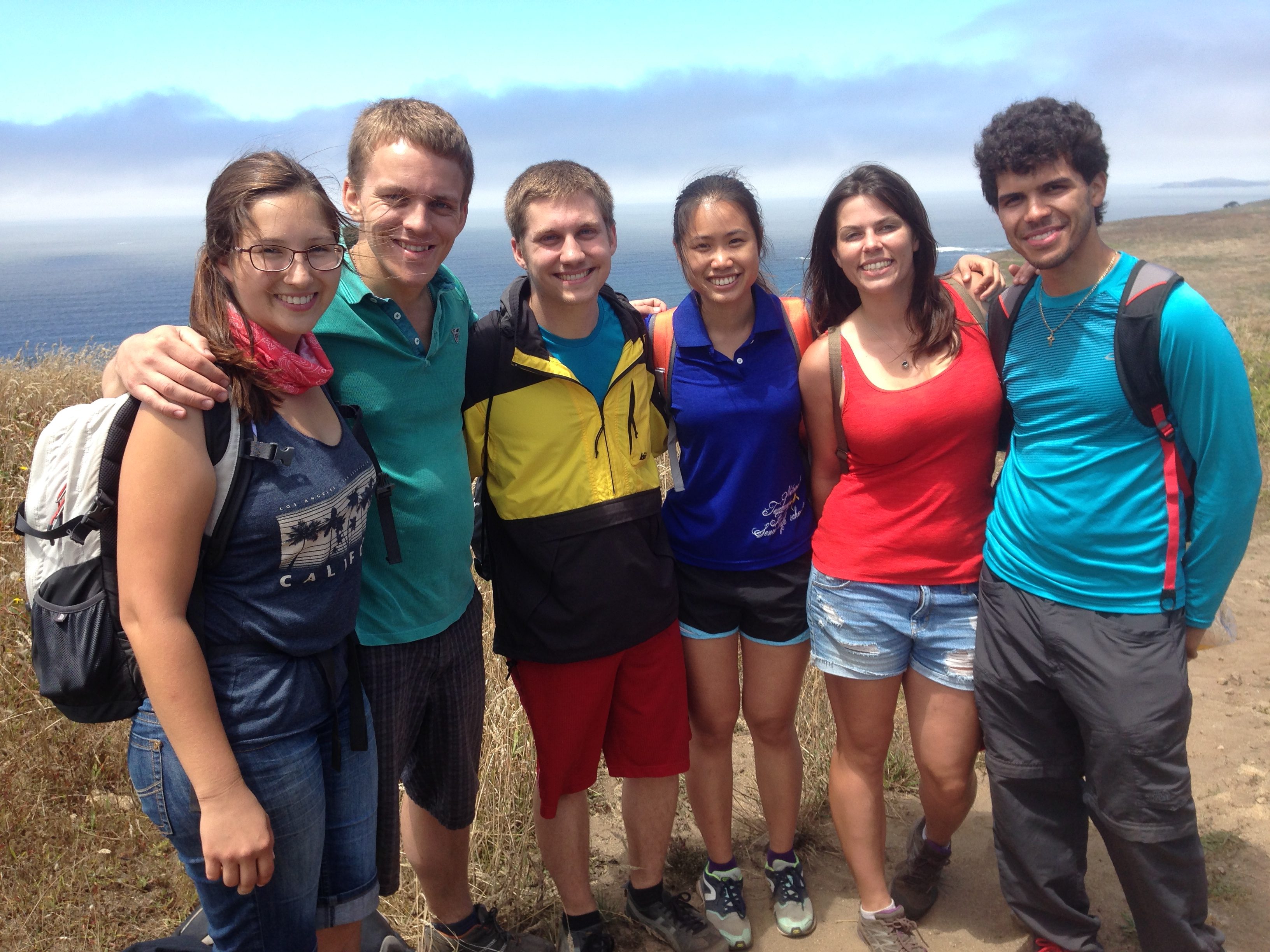







I wrote this article in response to Jennifer’s question. It has been three years since I graduated from Stanford and entered the workforce, so this is also a good opportunity for me to reflect on the major transitions in my life, think through the choices I made, and look forward to the future that I aspire to have. (At first, I thought I would pick two or three main points and write a short article, but it turns out that I have way more thoughts than expected, and I ended up writing perhaps the longest article in my blog. I expect myself to get busier and busier – not sure when will be the next time I can take the time to reflect and write things down this thoroughly!)
Taiwan (-2009)
When I read the biographies of great people in history, a common plot is someone had a great aspiration as a kid, strove tirelessly towards their aspiration, and then finally achieved their goals and left their mark in history. For example, since his childhood, Wang Xizhi practiced calligraphy so diligently that the pond where he washed his brushes and inkstone was dyed black into an “ink pond.” He turned out to be one of the greatest Chinese calligraphers in history. Thomas Edison, although did not fit quite into the education system at his time, loved to try out different scientific experiments since he was a teenager. He left the world with some of the most influential inventions in human history and is often described as America’s greatest inventor. Nelson Mandela had been an activist in racial equality since he was a student. He was imprisoned for decades for his visions, but eventually ended apartheid in South Africa and became an icon of human rights, democracy, and social justice. I, on the other hand, am not the kind of person who sets a goal at a young age and marches towards that goal without hesitation (so I probably will not be among the great people in history). Quite the opposite, my aspirations and dreams often change and are easily impacted by my mentors (not just my parents and my teachers at school, but also people who I truly respect as role models).
Before my second year in junior high school, I always thought I would study humanities in the future. (In the Taiwanese education system, we have to pick a study “track” – humanities or STEM – in high school.) I have always loved history and literature since I was a kid. Before our exams, our teachers usually reduced our homework assignments so that we could study for the exams. However, I always repurposed the extra time to read historical or classic novels. Back in the days, I didn’t like to study for exams, but I always did well in Chinese, history, geography, English, and even some related competitions. The talents that I was the proudest of were my writing skills and my eloquence. On the other hand, I was always on the borderline of failing my math and science exams, but I never cared much. If I had any “aspiration” that was remotely realistic back then, perhaps it was becoming a high-spirited lawyer and turning all my opponents speechless with my powerful language.
The transition from humanities to STEM took place at the beginning of my second year in junior high school. My homeroom teacher was a math teacher. Not only did he teach math really well, but he also had great confidence in me and was willing to spend time to help me get better. Therefore, I thought I’d at least learn math well. To my pleasant surprise, after I got better at math, significant progress in the sciences also followed. My teacher had higher and higher expectations for me, so in my last year of junior high school, I was determined to become the first student in my school to get into the STEM gifted program at Taichung Girls’ Senior High School (TCGS) to repay my teacher’s trust and support. (I still remembered we were in the middle of an English class when the admission results were announced. My teacher popped out by the window and tried to tell me the good news in sign language outside of the classroom. I guess he was just as excited as I was and could not wait until our English class was over.) Because of how the education system in Taiwan is set up, this transition took me to the path of no return in STEM.
My three years in the STEM gifted program at TCGS was very colorful and fulfilling. I had the most talented classmates, the best educational resources, and I did well in school. Yet there was a while when I was totally lost about my future. Most of my classmates wanted to become medical doctors, and our curriculum was set up in preparation for medical school. However, I am scared of blood, and I even threw up during a frog dissection lab. Therefore, I knew very early on that I am not cut out for medical school. (My parents never really encouraged me to become a medical doctor anyways.) Furthermore, I was not on good terms with my homeroom teacher (who is a physics teacher). I did terribly in physics, and he often hinted to me that I was going astray for every decision I made. For a while I was seriously considering switching to the humanities track, only to decide against it after my mom emphasized the importance of fundamental science training over and over again. Even so, I was still frustrated with my teacher and was determined to prove him wrong – he thought I was off the “right path,” but I wanted to show him I could shine brightly on whichever path I chose.
And then I thought of my dream of studying abroad: I wanted to broaden my horizons, elevate my visions, and experience a different life. Furthermore, in a US college, I wouldn’t need to choose a major until the end of my sophomore year, giving me more time to think about my future. I started to strive towards this goal and gave it my all. After my second year in high school, I gave up all my STEM competitions except for the science fair (because it was a group project and I didn’t want to drag my teammates down). I struggled to balance between schoolwork, studying for US standardized exams and preparing for US college applications, THG performances, and a few other extracurricular activities. It was extremely challenging and exhausting, but I kept telling myself I must make it work because I had too much pride to allow my teacher’s “going astray” comment to come true. While I was taking my SAT exams and writing my applications, I took full advantage of my solid STEM training, but I thought I would never study STEM in college because of my strong hatred against physics. The only school I applied in Taiwan was NTU Finance (in the School of Management) – this way I could technically be back on the humanities track while not letting all those years of math training go to waste. (I am a little embarrassed to admit it now, but I was also just trying to piss my teacher off since he wanted as many of us to get into medical school as possible.)


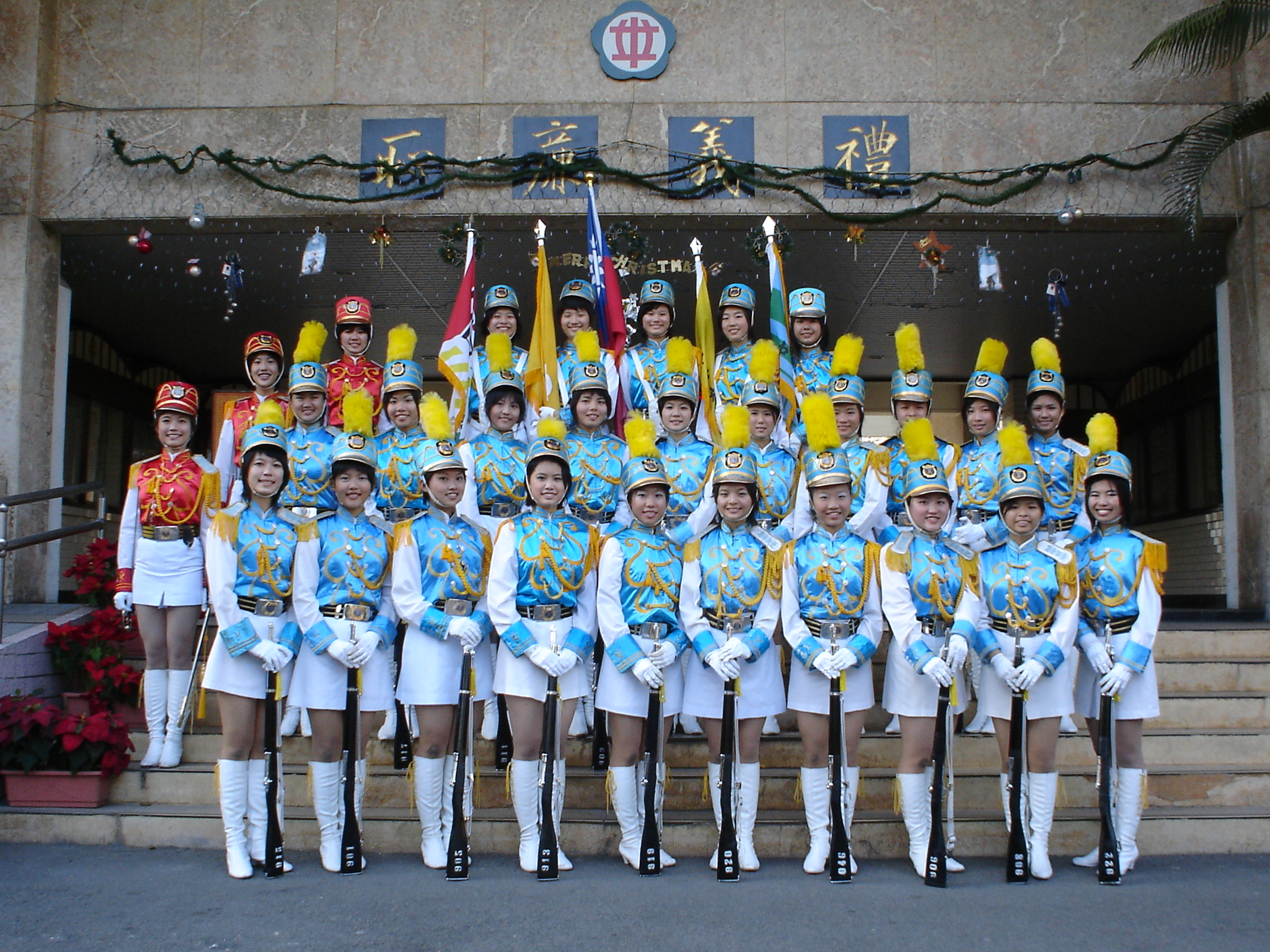



United States: In School (2009 – 2018)
Studying abroad was another major transition in my life. During my sophomore year at Northwestern, I surprised everyone by choosing to major in chemistry and linguistics, subjects that I would never have picked if I were in Taiwan. I chose chemistry because I took a few organic chemistry classes in my freshman year, which really sparked my thoughts. Northwestern also has one of the top chemistry programs in the world and most classes were very well taught. Further, when I was first trying to look for a research project, I was fortunate enough to meet a professor who was willing to take me in as a freshman. The graduate students in the lab, especially my mentor, took very good care of me and I learned a lot from them, so some part of me wanted to become like them. I chose linguistics because I simply followed my heart. I knew deep down I was still passionate about literature and history, but I had no advantage studying these subjects in a country that does not speak my native language. After being in the STEM track for several years, I was also much more comfortable with the STEM way of thinking. Linguistics is not literature. It is a social science that leverages scientific methods to study languages. To me, this means using tools that I am familiar with to study a subject that I have always been interested in. I took computational linguistics in my senior year, which led me to coding and programming, which, unexpectedly, ended up having a greater impact on my research in my last years at Stanford as well as my first job than any other STEM classes I have ever taken.
Now that I think of it, it seems like I just did whatever I wanted when I declared my majors. There were some practical considerations, but my decisions were mostly influenced by who I met and what I felt like learning at that time. I didn’t think, however, that I made irresponsible choices. I did well in both of my majors. Having seen what my parents did with their careers, I also believe that my ability to learn is more important than the subjects that I learn. Of course, having a strong knowledge foundation is a basic requirement, but I should use these challenging subjects to train my ability to learn instead of being limited to these subjects. I do recognize this is probably a bit romantic and idealistic because this didn’t really help me determine what I should do after graduation. I decided to get a PhD in chemistry for the same reason I got into the gifted program at TCGS – I wanted to repay the trust and support that my PI, my graduate student mentor, and my entire lab gave me. I wanted to go to the top chemistry PhD program in the world for them.
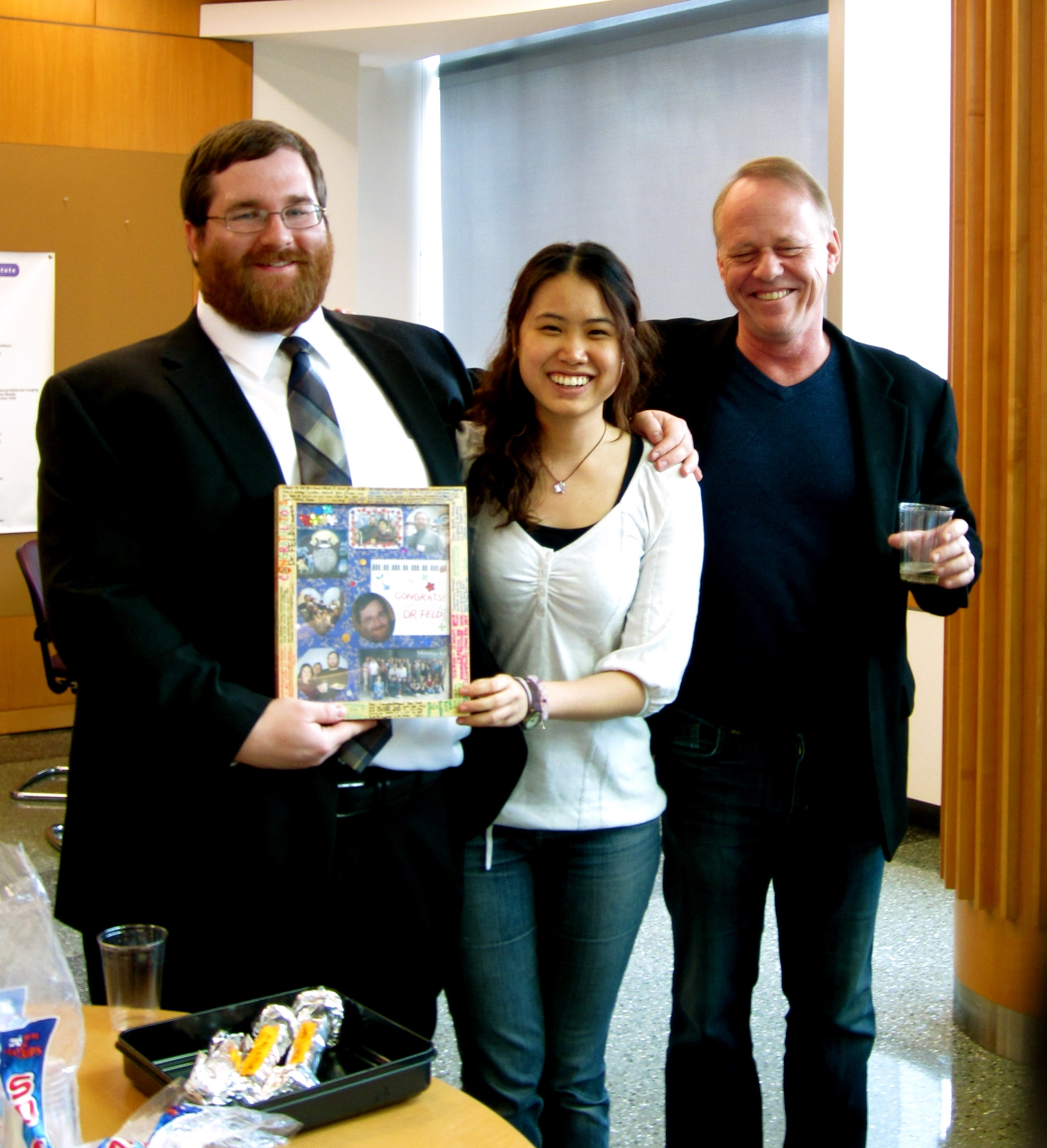
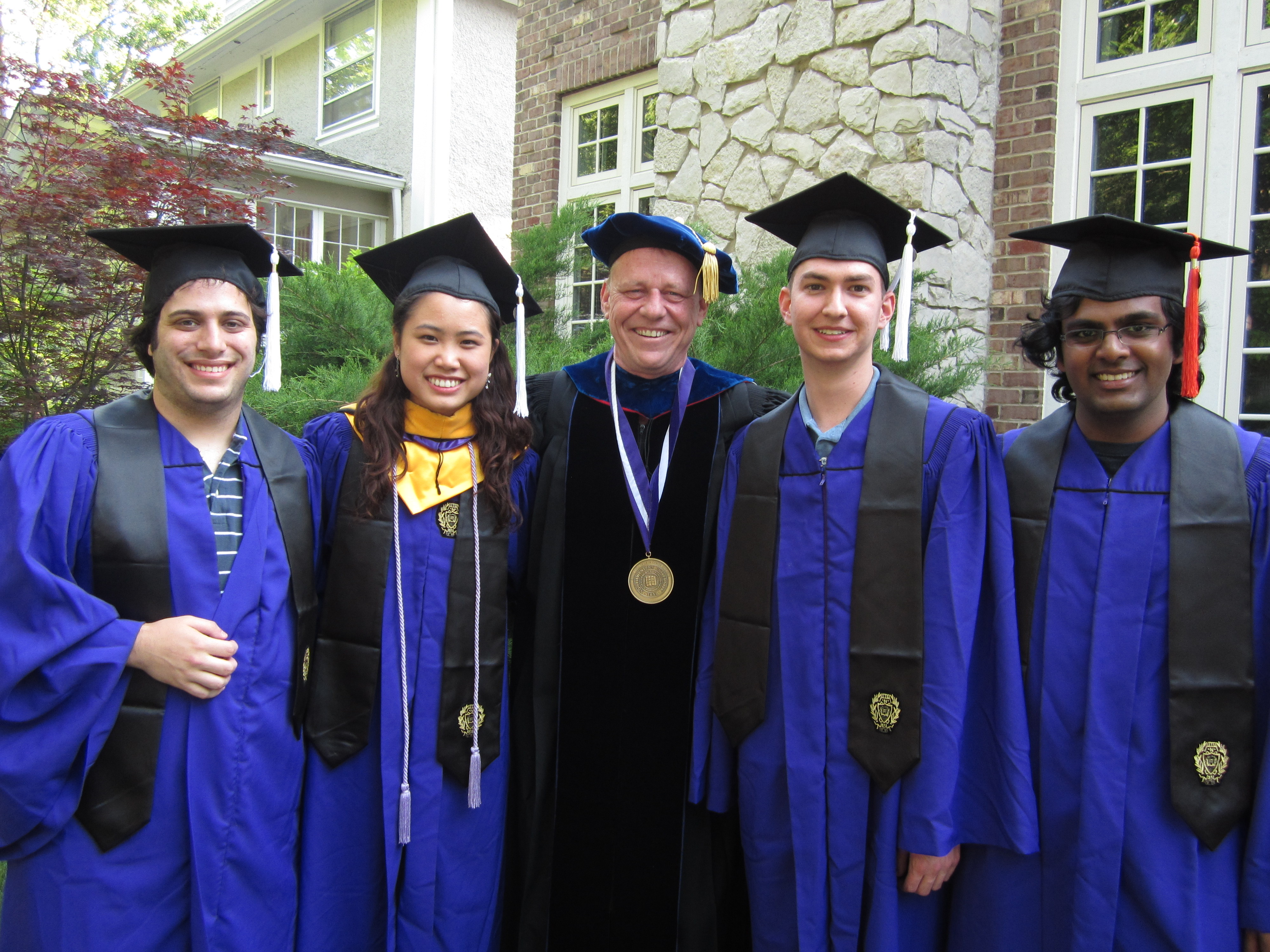

When I first arrived at Stanford, I was high-spirited, but part of me also worried that I was walking into a dead end because I knew I probably wasn’t really cutout for full-time research. However, I knew Stanford is a comprehensive university with extremely rich resources. A PhD is a terminal degree, so I should make the best of my time here and leverage everything Stanford has to offer to help myself find directions and build up skills. Since my first day in graduate school, I never stopped reminding myself I should make sure my path does not get narrower and narrower. Instead, as I become specialized in one area of knowledge, I should keep expanding my skillset and connect the dots whenever I can. I think I can say I succeeded in this after five years, even though the process was not as smooth as I thought.
When I first started, I was still passionate about research in chemical biology and medicine. I joined a famous organic chemistry lab, hoping that my background in inorganic chemistry and electrochemistry can spark innovation, but my miserable experience in the lab ruined it all for me, which led to my first major transition in graduate school. After seeing a therapist for a few times, I realized that I must get out of the shark tank – even if it might cost me my degree – otherwise the damage on me would be too disastrous to bare. Therefore, I started my long, painful journey to switching research groups. (My parents and close friends all know this unbearable experience too well, so I will not elaborate here.) Thankfully, I was able to find a young professor in the School of Earth, Energy & Environmental Sciences who was willing to accept me into her lab as an incoming third-year PhD. Her lab culture was very healthy and positive, and she gave me a lot of freedom to do research independently, allowing me to get my degree in five years even after a group switch.
I learned three very important lessons through this transition. First, my obsession with brand name faded away significantly. In the ten years prior to this, I had been very attached to the brand name of elite schools – in junior high school, I aimed at the top program in the best local public high school; in high school, I wanted to go to an elite college in the US; in college, I worked very hard to get into a top PhD program in the world. To me, elite schools mean abundant learning resources, talented teachers and classmates, fulfilling campus life, chances to improve myself, and endless opportunities after graduation (plus acknowledgement of my competence as well as satisfaction for my little bit of vanity). Before graduate school, these correlations were mostly accurate. Therefore, when I started Stanford, I continued to follow this logic and joined a prestigious lab. However, I was too naive to know that the loose structure, tenure system, power imbalance, and all kinds of political wrestling in the academia make things much more complicated. There are always dark shadows behind the halo of great fame: cutthroat competition, malicious personal attacks, ruthless exploitation, and violation of research ethics. Therefore, when I was looking for another research group, I kept reminding myself not to be dazzled by the prestige of a lab. Instead, I should spend time understanding what kind of a leader the PI is, how the lab group members get along with each other, and what my daily life might be like if I join the group. In other words, I finally started to understand that brand name does not always equal to positive development or a bright future, so I must collect as much information as possible and ask the right questions to make the best decision for myself. I also had to let go of my vanity and my obsession for brand name. Thankfully, my second PI is one of the best scientists I have ever met. In her lab, I felt very much in my element – I became much more efficient in doing research, learned a lot of new knowledge, and made many friends. Sometimes people wonder why I gave up a prestigious chemistry lab for a less well-known research group in the School of Earth, but I realized I no longer care that much about what other people think. When I was job hunting, I still mostly applied to big companies (visa concerns…), but I spent a lot more time trying to understand the company culture and envisioning my daily life in the company, instead of automatically choosing the company with the biggest brand name. I can’t say that every single decision I made is correct, but at least I have more realistic expectations for what I am getting myself into, and so far I have not fallen into another morass of toxicity and misery like my first lab at Stanford.
Secondly, I started to feel that “scientist” is more like a way of life rather than an occupation or status. The transition from chemical biology to environmental sciences was a pretty hard turn. However, after climbing the learning curve for a few months in my new group, my efficiency in research increased rapidly. I attribute a lot of it to a more positive and nourishing environment, but I also started to realize that I didn’t come to graduate school just to learn to become an “organic chemist,” “inorganic chemist,” or “geochemist.” Instead, I came to learn the scientific way of thinking: What problem am I trying to solve? What is my hypothesis to solve this problem? What experiments should I design to prove my hypothesis? How should I execute my experiments? How should I analyze and understand my results to solve the problem I was set out to solve? If my results are unexpected, what do I do next? This method is applicable to many fields: inorganic chemistry, organic chemistry, geochemistry, all sciences, and even business problems. Therefore, I am no longer attached to what “-ist” I am. Instead, I focused my energy on how to apply this method flexibly to solve all kinds of problems. When I was writing my thesis, the first half was about biorthogonal catalysis and bioluminescence, and the second half was about characterization and modeling of soil organic carbon. The topics might seem irrelevant, but analytical chemistry and the scientific method are what connected everything in my thesis. (This is a main reason why I started to call myself an analytical chemist to help others better understand what I did in graduate school.) When I started to view science as a way to guide my thoughts instead of a discipline with boundaries, my career options are no longer limited to research or benchwork, because I truly believe that my scientific training has enabled me to solve all kinds of problems in different fields. (Therefore, even though I don’t work as a chemist or research scientist now, I never thought my five years at Stanford was a waste of time.)
Finally, I realized that the people around me have a much larger impact on my efficiency and creativity compared to the actual work I am doing. Therefore, it is extremely important to surround myself with positive people. I was vaguely aware of this because all my top achievements in the past were either driven by wanting to repay others’ kindness or prove those who had doubts in me wrong. I have been very fortunate to be in decent learning environments for a good part of my life, and I met a lot of people who supported me, allowing me to thrive in school. I have been in extremely stressful or completely unfamiliar environments, but this was the first time I had to face outright malice. It wasn’t until I was trapped in a toxic environment did I realize that my ability to learn, creativity, efficiency, positive energy, and my ability to bring warmth and joy to those around me took a big hit. After I finally got out of the shark tank with tremendous effort, I swore that I will never let myself fall into the same swamp again. Before I commit myself to a new place, I should observe carefully and collect information thoroughly to make sure I am going into a place where I can thrive. If for whatever reason I am stuck in a toxic environment again, I must get myself out as quickly as I can before things get worse. Life is too short for me to make the same mistake again. I must make sure that I am surrounded by positive people who can help me grow into a better person.
After I joined my new research group, I spent three happy and fulfilling years at Stanford. Outside of research, I made sure I took advantage of everything Stanford has to offer and explored different fields. Since the beginning of my third year, I took a non-science class every quarter, from negotiation to accounting to intellectual properties. I continued to participate in many extracurricular activities, from startups, healthcare consulting to policymaking and student affairs. (Amazingly, all these activities did not distract me from research or make me any less efficient. Instead, I often came up with unexpected ideas and could connect the dots between different disciplines more easily. Perhaps a healthy environment can really enhance my competence. I ended up building many skills and getting to know myself better. I realized that while I really enjoy and cherish my science training, I don’t want to limit myself to the lab. I want to work with diverse groups of people and make a positive impact on the world. My first job after graduation was a good opportunity for me to make a transition.






United States: At Work (2018 – )
From a chemistry PhD to a consultant at Mastercard is perhaps the hardest turn I took so far. Many people are curious about why and how I made this transition. In fact, going from a PhD program to management consulting is not as uncommon as one might think. There were several of us in my class who took this route. In addition to all the reasons I talked about during my interviews, there are some personal reasons as well. Just like what I said in my earlier article “Dreams,” my dreams have shrunk as I get older because of practical concerns, such as the recruitment timeline of different industries, visa sponsorship, salaries and benefits…etc. Management consulting addresses all my practical concerns, gives me the opportunity to apply the scientific method to solve different problems, and may serve as a launchpad for other career options in the future. Most importantly, how I view my work and my life changed drastically since my mother was diagnosed with metastatic cancer. Prior to 2016, I was a workaholic to some extend: I worked extremely hard, working was the biggest part of my life, I used my accomplishment at work to measure my value, and I filled up my time outside of the lab with all kinds of extracurricular activities and side projects. Although I have been spending a good amount of quality time with my family every year when I went home, and I always make sure I am spending time with my friends, it wasn’t until 2016 did I realize just how important my family and those who I love are to me.
Therefore, I went through another transition, during which I rethought my life and my goals. I used to think the so-called “work-life balance” means work and life each takes up a certain percentage of my life. Since I used to be some sort of a workaholic, the portion of work was much bigger than life. However, I started to view my life as a whole – I should not arbitrarily split it into two parts and assign percentages. Instead, I have aspirations and goals for my life, and my work, life, and many other aspects (health, hobbies, family, self-realization…etc.) are all ways to achieve these aspirations and goals. They should be in synergy with each other rather than being mutually exclusive. So, what are my aspirations and goals? I want to keep learning new knowledge and apply my knowledge flexibly in different fields. In this fast-changing world, the only way to stay competitive is to keep learning and adapting. I want to make a positive impact on the world and people around me, whether it’s through impactful work, spending quality time with friends and family, or other channels. I want to stay connected to those who I love and build meaningful memories together. That way if any one of us leaves one day, what will be left will be warmth and not regrets.
My goals used to change a lot: whether I should choose the humanities or STEM track, what I should major in, which area(s) of research I should do…etc., but ever since I recognized my deepest desires for life in 2016, my underlying goals have been consistent even though my path has changed. Everything that I do, including the projects and employment that I picked, is to achieve these underlying goals. I spent a lot of time learning knowledge outside of my research in order to learn how to learn; after transitioning into management consulting, I tried to pick up different types of projects so that I can leverage my ability to learn to gain a broad spectrum of experience and open up doors for myself in the future. In my last three years at Stanford, all my extracurricular activities were either to serve the students or help with operations at Stanford so that I could have a positive impact. After I started to work, I tried to become a competent and reliable teammate for my colleagues and my clients, and I devoted the benefits, flexibility, and financial independence that my company gave me to causes that I care about. No matter what groups or activities I participate in, I do my best to make myself a positive presence and bring energy and warmth to those around me. As for my beloved family and friends, I have to admit that the circle has shrunk, but this also allows me to devote more time with each person. For things that are important to us, I will do everything I can to make it. Although we are spread out all over the world and COVID has made things extremely difficult, we made sure to stay connected through video chats, video recording, writing letters…etc. I also made sure I take every opportunity I have to let them know how much I love them so that I will leave no regrets.
Of course, even though I have my goals to guide me, my path has not been entirely smooth. For example, when I first entered the workforce, I went through quite a bit of growing pain that came with the transition: I went from the top expert in a highly technical field to a novice in a different field. I had to adjust my mentality and overcome self-doubt about whether my chemistry degrees are useful. When I was in school, I walked the walk – if there was an idea I wanted to try or a problem I had to solve, I rolled up my sleeves and got my acts together. However, there are a lot more bureaucracy, hierarchies, and politics that block me from getting things done. The frustration cannot be captured in a few words. In addition, while I was doing my PhD, I was very used to speaking with evidence. When my PI and I had disagreements, we often referred to data and literature, rather than authority or someone’s objective opinions, for a resolution. After I started my job, I noticed that not everyone has the same level of understanding and comfort with data and evidence as me. A lot of time even if the data is on my side, I had to consider the balance of power and conflict of interests among many other things when I try to solve a problem. How to communicate my data to convince others is also an art of its own. Although I did well in school learning complex, abstract knowledge, there is a lot more for me to learn when it comes to soft skills that require more life experience. When I am going through these setbacks, I always try to remind myself of my original aspirations and goals: I want to learn new knowledge, and my job presents opportunities to do so. New knowledge is not limited to hard skills such as data analytics, coding and making slides, but also soft skills that will help me survive the workplace that I can’t learn from a textbook. I want to make a positive impact, and my work allows me to help my clients and supports us to volunteer and make charity donations. I love my family and friends, and my work provides enough flexibility and financial freedom for me to spend time with them and do things I want to do for them. My aspirations and goals often light up my way when I am lost, and give me the energy I need to overcome difficulties and frustration. I don’t know where life will take me, or when I will go through another major transition again, but for now, I will continue to strive towards my goals. No matter how my goals change, I hope I will leave no regrets. If tomorrow is my next life, I want my heart to be at peace today because I have lived my life to the fullest.
